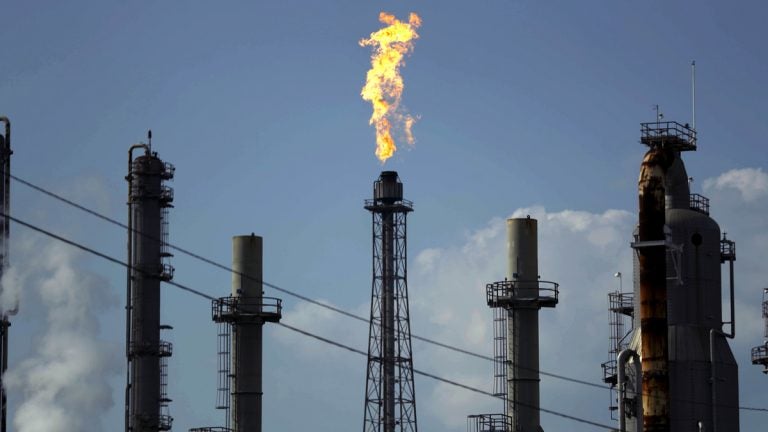Coast Guard: Most fuel spilled from tank farm during Hurricane Harvey unrecoverable

In this Thursday, Aug. 31, 2017, file photo, a flame burns at the Shell Deer Park oil refinery in Deer Park, Texas. Companies have reported that roughly two dozen storage tanks holding crude oil, gasoline and other fuels collapsed or otherwise failed during Harvey, spilling a combined 140,000 gallons of fuel, according to an Associated Press analysis of state and federal accident databases. Federal rules require companies to be prepared for spills, but don't require them to take any specific measures to secure the massive fuel storage tanks at refineries and oil production sites that are prone to float and break during floods. (Gregory Bull/AP Photo, file)
Less than 20 percent of a 461,000-gallon (1.7-million-liter) gasoline spill in Texas during Hurricane Harvey was recovered by the company responsible, while the rest evaporated or soaked into the ground, a U.S. Coast Guard official said Thursday.
Only a minor amount of the spill appeared to have escaped the Magellan Midstream Partners storage tank farm in Galena Park, Coast Guard Lt. Commander Jarod Toczko. It’s the largest spill reported to date from the storm that made landfall in Texas last month.
The Oklahoma-based company reported recovering about 2,000 barrels, or 84,000 gallons (320,000 liters), of gasoline in the days after the Aug. 31 spill, Toczko said. It’s unknown how much of the fuel evaporated and how much seeped into the ground.
“We know how much spilled, but it’s difficult to say the exact amount evaporated,” he said.
Gasoline is more volatile than oil, meaning it evaporates more quickly after it’s spilled. It’s also more likely to catch fire and can more rapidly penetrate the soil and potentially contaminate groundwater.
Magellan spokesman Bruce Heine says a cleanup of contaminated soil at the company’s facility should be completed within a few weeks. He estimated that less than five gallons (19 liters) of fuel reached a small waterway adjacent to the company’s property that drains into the Houston Ship Channel. The rest was contained onsite.
“Although we do not have an estimate of the total volume of soil that we will remove and replace at this time, the project will comply with all laws and regulations,” he said.
The Associated Press has identified more than 30 fuel and chemical storage tanks that failed during the storm and released more than 600,000 gallons (2.2 million liters) combined of crude oil, gasoline and other chemicals.
Two storage tanks failed in the Magellan case. Initial indications suggested the massive tanks floated off their foundations as floodwaters swamped the company’s tank farm, Toczko said. That’s what happened at tank farms in Louisiana during Hurricane Katrina, when numerous storage tank failures spilled millions of gallons of fuel into floodwaters.
Magellan has said only that the spill was “related to flooding associated with the hurricane.” Heine said Thursday that the cause remained under investigation.
WHYY is your source for fact-based, in-depth journalism and information. As a nonprofit organization, we rely on financial support from readers like you. Please give today.




